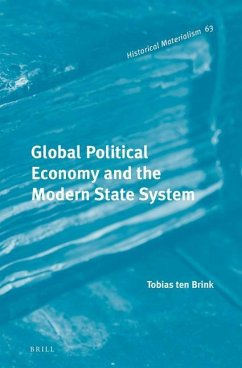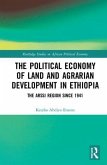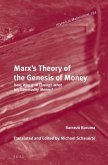Tobias Ten Brink
Global Political Economy and the Modern State System
Tobias Ten Brink
Global Political Economy and the Modern State System
- Gebundenes Buch
- Merkliste
- Auf die Merkliste
- Bewerten Bewerten
- Teilen
- Produkt teilen
- Produkterinnerung
- Produkterinnerung
In Global Political Economy and the Modern State System Tobias ten Brink contributes to an understanding of the modern state system, its conflicts, and its transformation.
Andere Kunden interessierten sich auch für
![In Marx's Laboratory In Marx's Laboratory]() In Marx's Laboratory223,99 €
In Marx's Laboratory223,99 €![Marxism and Social Movements Marxism and Social Movements]() Marxism and Social Movements223,99 €
Marxism and Social Movements223,99 €![A Marxist Mosaic A Marxist Mosaic]() Jairus BanajiA Marxist Mosaic279,99 €
Jairus BanajiA Marxist Mosaic279,99 €![The French Revolution and Historical Materialism The French Revolution and Historical Materialism]() Henry HellerThe French Revolution and Historical Materialism166,99 €
Henry HellerThe French Revolution and Historical Materialism166,99 €![The Political Economy of Land and Agrarian Development in Ethiopia The Political Economy of Land and Agrarian Development in Ethiopia]() Ketebo Abdiyo EnseneThe Political Economy of Land and Agrarian Development in Ethiopia206,99 €
Ketebo Abdiyo EnseneThe Political Economy of Land and Agrarian Development in Ethiopia206,99 €![Marx's Theory of the Genesis of Money Marx's Theory of the Genesis of Money]() Samez Kuruma &Marx's Theory of the Genesis of Money142,99 €
Samez Kuruma &Marx's Theory of the Genesis of Money142,99 €![The 'American Exceptionalism' of Jay Lovestone and His Comrades, 1929-1940 The 'American Exceptionalism' of Jay Lovestone and His Comrades, 1929-1940]() The 'American Exceptionalism' of Jay Lovestone and His Comrades, 1929-1940309,99 €
The 'American Exceptionalism' of Jay Lovestone and His Comrades, 1929-1940309,99 €-
-
-
In Global Political Economy and the Modern State System Tobias ten Brink contributes to an understanding of the modern state system, its conflicts, and its transformation.
Hinweis: Dieser Artikel kann nur an eine deutsche Lieferadresse ausgeliefert werden.
Hinweis: Dieser Artikel kann nur an eine deutsche Lieferadresse ausgeliefert werden.
Produktdetails
- Produktdetails
- Verlag: Brill
- Seitenzahl: 290
- Erscheinungstermin: 3. April 2014
- Englisch
- Abmessung: 239mm x 163mm x 23mm
- Gewicht: 567g
- ISBN-13: 9789004262218
- ISBN-10: 9004262210
- Artikelnr.: 40566467
- Herstellerkennzeichnung
- Libri GmbH
- Europaallee 1
- 36244 Bad Hersfeld
- gpsr@libri.de
- Verlag: Brill
- Seitenzahl: 290
- Erscheinungstermin: 3. April 2014
- Englisch
- Abmessung: 239mm x 163mm x 23mm
- Gewicht: 567g
- ISBN-13: 9789004262218
- ISBN-10: 9004262210
- Artikelnr.: 40566467
- Herstellerkennzeichnung
- Libri GmbH
- Europaallee 1
- 36244 Bad Hersfeld
- gpsr@libri.de
Tobias ten Brink, Ph.D. (2007), is a senior researcher at Goethe University in Frankfurt. In addition to several monographs, such as Chinas Kapitalismus. Entstehung, Verlauf, Paradoxien (Campus, 2013), he has published numerous articles on comparative capitalisms, international relations and China.
Acknowledgements
Preface by Bob Jessop
Introduction
Organisation of the book
PART ONE: PERIODS OF THEORISING CONFLICT IN THE MODERN STATE SYSTEM
I. Critical-liberal, Marxist and neo-Weberian approaches
II. Power-politics and (Neo-)Realism within the field of International
Relations
III. Deficits and Desiderata for future research
1. Preliminary summary
PART TWO: A GPE FRAMEWORK FOR EXPLAINING GEOPOLITICS
I. Foundations for analysing capitalism
1. Analyses of the capitalist mode of production
2. Structural features of capitalism
II. Capitalism as a globally fragmented system across space and time
1. Combined and uneven development, relations of space and time, and the
'international'
2. The dynamic of the global economic process of accumulation
3. The dynamic of the international state system
4. Considerations on various forms of competition
III. Historical phases of the world order and the periodisation of
socio-economic and geopolitical power relations
1. Structural features, phases and constellations
2. Hegemonic and non-hegemonic phases of world order
3. Phases of socio-economic development
4. Phases of statehood
PART THREE: MARKET-LIBERAL STATISM: CONTEMPORARY GEOPOLITICAL PHENOMENA
I. The balance between soft and hard geopolitics
1. 'Democratic wars'
2. Excursus: International law within fragmented capitalism
II. Geopolitical and economic competitive relations
1. The aspirations and realities of US empire
2. The EU and the US: A conflict-laden partnership
3. China and the US: A new cold war?
Summary
Bibliography
Index
Preface by Bob Jessop
Introduction
Organisation of the book
PART ONE: PERIODS OF THEORISING CONFLICT IN THE MODERN STATE SYSTEM
I. Critical-liberal, Marxist and neo-Weberian approaches
II. Power-politics and (Neo-)Realism within the field of International
Relations
III. Deficits and Desiderata for future research
1. Preliminary summary
PART TWO: A GPE FRAMEWORK FOR EXPLAINING GEOPOLITICS
I. Foundations for analysing capitalism
1. Analyses of the capitalist mode of production
2. Structural features of capitalism
II. Capitalism as a globally fragmented system across space and time
1. Combined and uneven development, relations of space and time, and the
'international'
2. The dynamic of the global economic process of accumulation
3. The dynamic of the international state system
4. Considerations on various forms of competition
III. Historical phases of the world order and the periodisation of
socio-economic and geopolitical power relations
1. Structural features, phases and constellations
2. Hegemonic and non-hegemonic phases of world order
3. Phases of socio-economic development
4. Phases of statehood
PART THREE: MARKET-LIBERAL STATISM: CONTEMPORARY GEOPOLITICAL PHENOMENA
I. The balance between soft and hard geopolitics
1. 'Democratic wars'
2. Excursus: International law within fragmented capitalism
II. Geopolitical and economic competitive relations
1. The aspirations and realities of US empire
2. The EU and the US: A conflict-laden partnership
3. China and the US: A new cold war?
Summary
Bibliography
Index
Acknowledgements
Preface by Bob Jessop
Introduction
Organisation of the book
PART ONE: PERIODS OF THEORISING CONFLICT IN THE MODERN STATE SYSTEM
I. Critical-liberal, Marxist and neo-Weberian approaches
II. Power-politics and (Neo-)Realism within the field of International
Relations
III. Deficits and Desiderata for future research
1. Preliminary summary
PART TWO: A GPE FRAMEWORK FOR EXPLAINING GEOPOLITICS
I. Foundations for analysing capitalism
1. Analyses of the capitalist mode of production
2. Structural features of capitalism
II. Capitalism as a globally fragmented system across space and time
1. Combined and uneven development, relations of space and time, and the
'international'
2. The dynamic of the global economic process of accumulation
3. The dynamic of the international state system
4. Considerations on various forms of competition
III. Historical phases of the world order and the periodisation of
socio-economic and geopolitical power relations
1. Structural features, phases and constellations
2. Hegemonic and non-hegemonic phases of world order
3. Phases of socio-economic development
4. Phases of statehood
PART THREE: MARKET-LIBERAL STATISM: CONTEMPORARY GEOPOLITICAL PHENOMENA
I. The balance between soft and hard geopolitics
1. 'Democratic wars'
2. Excursus: International law within fragmented capitalism
II. Geopolitical and economic competitive relations
1. The aspirations and realities of US empire
2. The EU and the US: A conflict-laden partnership
3. China and the US: A new cold war?
Summary
Bibliography
Index
Preface by Bob Jessop
Introduction
Organisation of the book
PART ONE: PERIODS OF THEORISING CONFLICT IN THE MODERN STATE SYSTEM
I. Critical-liberal, Marxist and neo-Weberian approaches
II. Power-politics and (Neo-)Realism within the field of International
Relations
III. Deficits and Desiderata for future research
1. Preliminary summary
PART TWO: A GPE FRAMEWORK FOR EXPLAINING GEOPOLITICS
I. Foundations for analysing capitalism
1. Analyses of the capitalist mode of production
2. Structural features of capitalism
II. Capitalism as a globally fragmented system across space and time
1. Combined and uneven development, relations of space and time, and the
'international'
2. The dynamic of the global economic process of accumulation
3. The dynamic of the international state system
4. Considerations on various forms of competition
III. Historical phases of the world order and the periodisation of
socio-economic and geopolitical power relations
1. Structural features, phases and constellations
2. Hegemonic and non-hegemonic phases of world order
3. Phases of socio-economic development
4. Phases of statehood
PART THREE: MARKET-LIBERAL STATISM: CONTEMPORARY GEOPOLITICAL PHENOMENA
I. The balance between soft and hard geopolitics
1. 'Democratic wars'
2. Excursus: International law within fragmented capitalism
II. Geopolitical and economic competitive relations
1. The aspirations and realities of US empire
2. The EU and the US: A conflict-laden partnership
3. China and the US: A new cold war?
Summary
Bibliography
Index








